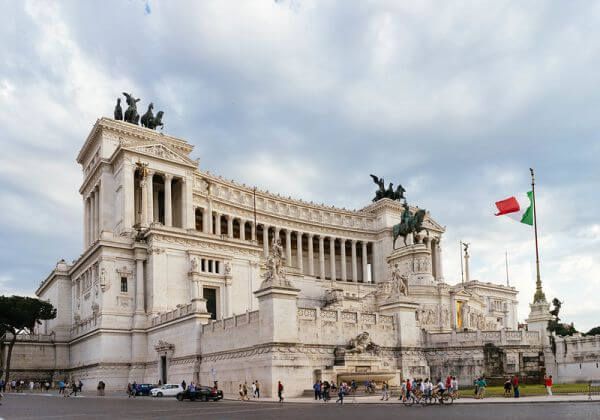How stable is Israeli democracy? All free countries experience political crises at different points in time. And whenever these crises arise, the media will interview political pundits for their “expert opinion” who sometimes conclude that the country and/or its democracy are “unstable.” However, painting any country with such a damning label belies a misunderstanding of the differences between politics and democracy.
Like other Western countries, Israeli democracy is no stranger to political ups and downs. With so many media outlets attempting to get the right analysis for their readers, the quest for superlatives to describe the situation can get them confused between the rulers and the regime.
The misperception of “democratic instability” arises when something abnormal happens involving both the political echelon and a country’s democratic institutions. When events involve the two, even the experts get confused and forget that there is a huge difference between politics and a country’s democratic stability.
Israel went through more than one national election in 2019 and allegations of corruption have been in the headlines all year.
But does that mean Israeli democracy is stable or not?
Let’s check and see.
Join the fight for Israel’s fair coverage in the news
Democratic Stability: What It Is and Isn’t
What exactly constitutes democratic instability? An Organization of American States report on democratic stability describes an unstable democracy as having a “crisis of governance and stability in the institutions of the … political system.” For example, the leader of the government dismisses the supreme court and has opposition leaders arrested.
The destabilization of a democracy is seen when a regime crisis leads to an attack on the nature of the country’s independence and its independent constitutional structures. An unstable democracy would exhibit severe events like a breakdown not just in the justice system, but in the enforcement of law and order, collection of taxes and the distribution and disbursement of federal funds. The instability would affect food security, health, education, welfare, trade, transportation and the supply of essential services like electricity, water, and fuel.
And in an unstable democracy, there is often no peaceful transition of power. One key stabilizing factor of democracy is when the opposition becomes the government and while those in power relinquish their hold and peacefully shift over to opposition benches.
So, looking at all these symptoms of an unstable democracy, it’s safe to say that Israel is a rock-solid, stable democratic state.
Related reading: The Chaos of Israeli Democracy: An Explainer
Misunderstanding the Storm
The mistake arises when pundits get carried away during a period of political instability and become confused trying to explain what’s going on. Judging whether Israeli democracy is stable depends on the elements outlined above, but instead a mix-up emerges from wrongly trying to connect the storms surrounding the politicians with an adverse effect on the foundation of the country in which those storms are occurring.
Safely navigating political upheaval happens to be a central feature of strong democracies.
 Political instability is often found in some of what we consider to be the most unshakeable democracies on the planet. America was badly traumatized by the Kennedy assassination and Watergate crisis. Britain’s parliament has recently gone through a series of political storms surrounding Brexit leading to uncertainty, resignations and snap general election. Even Canada, often perceived as being quiet and mundane, had a bout of major instability when martial law was declared in the 1970s and civil rights were suspended.
Political instability is often found in some of what we consider to be the most unshakeable democracies on the planet. America was badly traumatized by the Kennedy assassination and Watergate crisis. Britain’s parliament has recently gone through a series of political storms surrounding Brexit leading to uncertainty, resignations and snap general election. Even Canada, often perceived as being quiet and mundane, had a bout of major instability when martial law was declared in the 1970s and civil rights were suspended.
Those three stalwarts of democracy were wracked by some short-term political instability, but their democratic institutions remained intact, fully functioning and weathered the political storms.
Israel is known for its political turmoil over the years, but none of those crises –- including repeat national elections in 2019 over the inability to form a coalition — has affected the democratic institutions that underpin the country. Like other democracies, Israel’s politics are stormy, but its democratic framework remains on an even keel.
Those unfamiliar with Israel’s political system misinterpret the appearance of political chaos as “unstable” compared to what they know, but in reality, Israel is one of the more stable countries in western society.
Italy is often used as a prime example of political turbulence coupled with democratic stability. The Italians have gone through 44 prime ministers heading 62 different governments since 1948. Yet despite the modern history of almost constant political turmoil, tourists flock to Italy for its flamboyance, style, history, art and, of course, its food. Italy’s government changes almost every year, but the word that least comes to mind is “unstable” even though in that same time Israel has had only 12 prime ministers and 34 governments in the same time.

Unlike other democracies that have known peace since World War II, Israel has repeatedly been confronted with war and adversity, yet has always shown strong resilience. It has held 22 national elections, which is on par with other countries and when the ruling party was voted out of office there has always been a peaceful transition of power – a central pillar of democratic stability.
In comparing political stability, the United States usually tops the rankings because under its constitution, national presidential elections are held every four years and the government remains in office for the duration of that time, even though elections for the House of Representatives and the Senate are staggered and occur every two years.
Related reading: So Why Can’t Palestinians Vote?
Israel Compared to the West
The stability of any system is hard, if not impossible, to evaluate in isolation. Comparison with Western states reveals Israeli democracy to be stable in structure, with Israel’s parliamentary system similar to other western democracies no matter if they use a proportional representation system like Israel (e.g. Holland and Switzerland) or a British-type system of direct election of local representatives to a national parliament (like Canada, the UK and Australia).
Parliamentary elections are generally held every four years, but must take place when the government loses a major vote (like a budget), or votes to dissolve itself. This means that unlike the set date in the US, parliamentary democracies can have elections at any time. And if a government fails to be formed after an election, the people are forced to go back to the polls and vote again – which Israelis did in 2019.
Related reading: How Do Israeli Elections Work?
On average, Israel has held national every 3.2 years, which is the same as Canada and Sweden, but higher than Australia where elections occur every 2.6 years. In contrast, Britain holds elections on average every 3.5 years, Switzerland and Germany every 3.7 years, and the USA every 4.0 years.
Israeli voters take their democracy seriously and turn out to vote, with 70 percent casting their ballots in the September 2019 election. A 2016 report by the International Institute for Democracy and Electoral Assistance on voter turnout showed that Israel ranks higher than Canada, Germany and even Greece – the mother of democracy where voting is compulsory by law. For comparison, only 61.4% of eligible Americans voted in the 2016 presidential election.

The Electoral Integrity Project, an independent academic project based at Harvard University and the University of Sydney, gives Israel a score of 74 for the integrity of its electoral process, on par with western European countries like France (75), Ireland (73) and Belgium (71).
Like all other democratic rankings by universities and think tanks, Israel is at the top of the list for democracy in the Middle East, but the Harvard/Sydney analysis also scores Israel higher than Japan (68), Australia (70), Italy (68), Spain (69) and Greece (66).
And to wrap things up, the Democracy Index published by The Economist ranks Israel 30th in the world scored on the substantive issues of electoral process and pluralism, functioning of government, political participation, political culture, civil liberties and regime type. It is noteworthy that in that same index, Belgium, the seat of the European Parliament, ranks lower than Israel – yet nobody considers Belgium to be an “unstable democracy.”
* * *
To summarize, critics of Israel will too often incorrectly point to political instability as a reflection on its democracy. They confuse the two and forget that political instability is part of the nature of many stable democracies. At its core, Israeli democracy is stable and resilient in the face of political turmoil.
Israel has all of the central key factors commonly cited as favoring stable democracy including the rapid democratization on its founding, a political culture with a strong (albeit sometimes seemingly chaotic) party system and a solid base of democratic institutions. In the face of war and adversity, Israeli democracy continues proving its stability.
Images: Italian parliament CC BY Marco Verch; Israeli voter CC BY-SA Heinrich-Boll-Stiftung;

